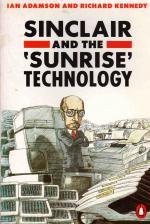
ZX Computing
 1st January 1987
1st January 1987
Categories: Review: Book
Author: Ray Elder
Publisher: Penguin
Machine: Spectrum 48K
Published in ZX Computing #33
Sinclair And The Sunrise Technology
The authors, Ian Adamson and Richard Kennedy, have varied and coloured backgrounds including a few credits in the field of computer journalism, though noticeably not in the Sinclair field until now, at least according to their given personal briefs.
This very 'distance' from the whole subject probably stood them in good stead in the writing of the book and contributes to its lack of emotional colouring in favour on the charismatic Sir C.
Unlike some tomes which I have read, the authors do not view Sir Clive Sinclair through rose-tinted glasses but by using facts, reports and documented statements they have researched and produced what must be the definitive account of his business ventures to date.
Devotees will find that their concept and perceptions of the man may well need a little reappraising, but even so he has been treated gently and emerges as a likeable personality.
You may have gathered by now that this is not a superficial sop to the masses, it does not simply present a potted history of the events and pad it out with opinion, technical references, photographs and diagrams. Indeed there are none of the latter and the technical input is limited to brief and easily understood explanations where necessary.
Opinions are part and parcel of the text although they are presented in academically acceptable form as reasonably argued ideas which are well supported by documented evidence and the events of the time. Without taking months to check and correlate on the material presented by them I can only concede that they have a persuasive and almost certainly accurate account of the whole affair.
I am not sure of the market to which this book is aimed, as an authorative academic book it is valuable for schools and colleges for social studies, business and perhaps political courses. The rather dry, unsensational approach would tend to limit its appeal to the more thoughtful individual and in this category I would also put the established hobbyist (or 'obsessive' as the book occasionally labels us) and perhaps the anti-Sinclair brigade who seem to look for any excuse to put him down.
The great majority of Sinclair users will probably not be interested in this book though I found it a fascinating and plausible account of a period of history which may be regarded in our future as the turning point of a new era. Only time will tell!


